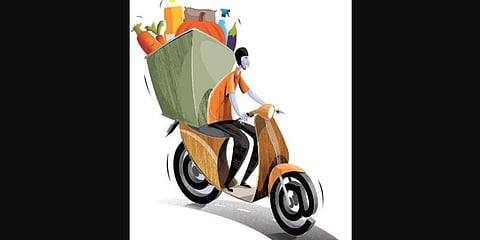

BENGALURU: With a majority of people preferring to shop groceries online, especially after the onset of the pandemic, both industry heavyweights and new entrants are exploring a new vertical — quick commerce or q-commerce.
Over a few months now, there has been quite a disruption in the grocery delivery space with a new entrant Zepto, which operates a 10-minute grocery delivery service; Grofers rebranded as Blinkit and promising a 10-minute delivery; and Swiggy investing $700 million in its express grocery delivery service Instamart. Swiggy is also planning to make deliveries in 15 minutes starting January 2022.
So, why are companies now focussing on quick commerce, where everyone promises to deliver within 10 or 20 minutes? Experts attribute this to change in consumers’ purchasing behaviour and preference.
Quick commerce is estimated at $ 0.3 billion in CY2021 and is expected to grow 10-15x in the next 5 years, to become $5 billion by 2025, according to Redseer.
It says that about 20 million households are addressable by quick commerce in India with an estimated addressable market size of $ 50 billion in 2020. Q-commerce will become one of the major e-commerce models and it will cater to the growing needs of the consumers.
The report added, “Emerging as one of the fastest growing e-commerce models, q-commerce is serving the need for faster delivery among convenience seeking customers.
With high fill-rates and 30-45 minutes delivery service for unplanned orders, mid-to high income households in Metros are increasingly replacing traditional kiranas with q-commerce platforms like Swiggy’s Instamart and Dunzo.”
Launched five months ago, Zepto is a 10-minute grocery delivery app. It recently raised $100 million in Series C. It has been growing quickly, and is tripling its user-base every month.
Over the past two months, apart from Mumbai, Zepto expanded in Bengaluru, Delhi, Gurugram, Chennai, Hyderabad and Pune. It is planning to launch in Kolkata soon.
“Quick commerce offers a chance to revolutionise the way people buy essentials. We believe in gaining more market share in all major Indian cities. We are ramping up a team - right from supply chain to marketing and finance. Also, 10-minute delivery done consistently is not only an operational complex task but requires a deep understanding of technology as well,” Zepto Co-Founder and CEO Aadit Palicha tells TNIE.
Also, consumers are now preferring fresh products with consistent quality in a very quick time. Zepto wants to gain access to customers in more micro markets, and it is also working on ways to expand delivery to tier-2 and tier-3 cities as well.
The future of commerce
Zomato-backed Grofers recently rebranded as Blinkit, and started focussing on delivery in 10 minutes.
“The Blinkit service will now be available in only the areas where we are able to arrive at our customers’ locations within 10 minutes (or less). We are singularly committed to instant delivery - focusing only on areas where we are serving under 10 minutes, and deprioritising everything else. We hope to be insanely consistent with our 10 minutes promise,” says Blinkit founder Albinder Dhindsa in a blog post.
Blinkit has temporarily stopped serving all other areas where it was not able to offer deliveries in 10 minutes.
“While we understand a 15-minute or 20-minute delivery service would be better than no service, our systems and infrastructure are built solely with 10 minutes (or less) in mind,” he adds.
Swiggy Instamart has on-boarded more than one seller-run dark store every day in the last few months.
It is also planning to make deliveries in 15 minutes by January 2022, by having the network of dark stores very close to the majority of its customers.
Dark stores are warehouses or outlets through which e-commerce companies deliver their orders quickly.
Mostly these stores will be established in cities in the q-commerce model, so as to deliver as quickly as possible. Swiggy Instamart is serving customers across 18 cities, and doing over 1 million orders per week.
“At our current growth trajectory, Instamart is set to reach an annualised GMV run rate of $1 billion in the next three quarters,” said Sriharsha Majety, CEO, Swiggy.
Tata’s BigBasket is said to enter the q-commerce space soon. There are other major players such as Google-backed Dunzo which is delivering essentials in 19 minutes.
Challenges galore
Though companies are promising 10-20-minute delivery, the e-commerce players face many challenges. Talking about it, Zepto CEO says building technology to consistently get product delivered in 10 minutes and also manage a supply chain in a way that responds to such a high-touch and high-frequency use case are some of the interesting problems in quick-commerce today.
Transport marketplace start-up Vahak’s CEO and Co-founder Karan Shaha says, "The 10-minute deliveries or under-20-minute deliveries are easier to accomplish than assumed once we get the right network coverage in terms of stores under a brand. Most hyperlocal deliveries leverage the existing shops within the residential areas. The major areas of focus are technology integration at the POS, good internet connectivity to process orders, better payments and a reliable network of delivery personnel."
All these founders say that q-commerce will sustain and see more traction in coming years, and back-end technology and supply chain will play a crucial role in deliveries.